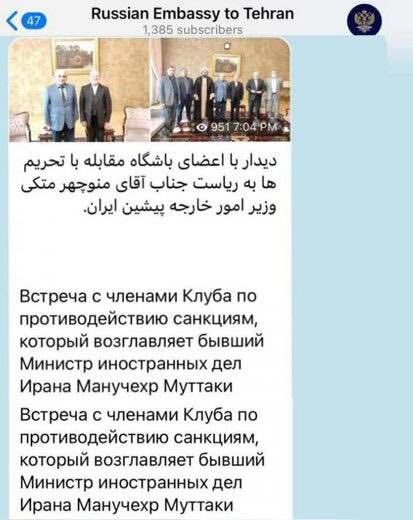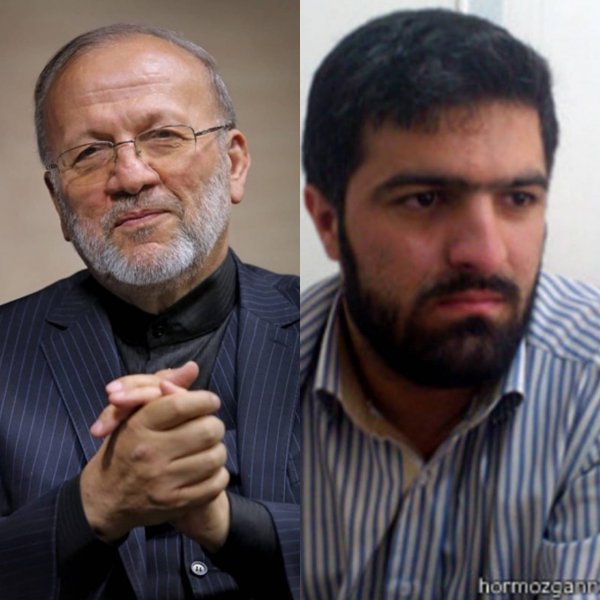What was the dismissed minister doing at the Russian embassy?
What was the dismissed minister doing at the Russian embassy? The Russian embassy in Iran has hosted the Sanction Club. The official Telegram channel of the Russian embassy in Tehran announced a meeting with the members of the Anti-Sanction Club, chaired by Mr. Manouchehr Mottaki, the former Foreign Minister of Iran. Mottaki is the same Foreign Minister from Ahmadinejad’s administration who was dismissed in an unusual and strange manner during a work trip, receiving the news of his dismissal from his Senegalese counterpart.
In 2010, during a trip to Senegal to deliver Ahmadinejad’s message to the president of that country, Mottaki heard about his dismissal from the host country’s officials in the middle of a negotiation session. Mottaki’s current position is as a senior advisor to the Secretary of the World Assembly for the Proximity of Islamic Schools of Thought, and he has recently become the head of the House of Parties. This meeting took place while Levan Jagaryan, the current Russian ambassador, is leaving Iran and handing over his post to his successor, Alexey Dedov, a Russian diplomat.
The threatener of assault becomes the secretary of the club
But who are the members and founders of this club? A look at the backgrounds of some influential figures in this club highlights the presence of two groups: the dismissed officials from Ahmadinejad’s administration and those affiliated with Imam Sadegh University. Manouchehr Mottaki is apparently the president or director of this club and has a very good relationship with Imam Sadegh University, having frequently visited it for speeches in recent years.
Alireza Farghani, who became the governor of Kish at the age of 30 in 2011, is also the secretary of the club’s policy-making council. According to his own claims, he was dismissed from his position due to his opposition to the so-called ‘deviant’ faction in Ahmadinejad’s government.
He stated that the idea of forming the Sanction Club was proposed in Iran in 2013 but had not found much ground for operationalization. However, after the Crimea crisis, when Russia was also sanctioned by the US, a very good opportunity arose for sanctioned countries to form a club against the US and its sanctions. Notably, in the same year, he made a bizarre statement threatening to assault Obama’s daughter.
In his personal blog, he wrote that he hoped Obama would foolishly attack Syria, which would result in
1. The exposure of all weaknesses of all American interests worldwide to all people of the world; simple training of operations.
2. Within 21 hours, a member of every American minister’s family, American ambassadors, and American military commanders worldwide will be kidnapped.
3. In the next 18 hours, videos of their dismemberment will be shown to everyone; the videos will be sent manually.
4. Obama should be reminded that if there are bastards in America and other parts of the world, there are bastards who can easily assault Sasha, Obama’s daughter.
It is enough to befriend them and establish a connection, which has been done. 5. Obama, attack Syria so that you will be erased from the face of the earth forever, and the world’s public opinion will justify it.
Some American news sites published this with headlines such as ‘Iran threatens to assault Obama’s daughter if Syria is attacked,’ and by creating a stir, attributed this individual’s personal stance on his blog to Iran. The Daily Caller website, by publishing this news, wrote that considering Farghani is an analyst and strategist member of the Ammar Base, which this website describes as a radical think tank in the Islamic Republic of Iran, his words can reflect the opinions of some parts of the Islamic system regarding America.

What is the club pursuing?
It is unclear to what extent this anti-sanction club exists on paper and how far it has taken practical actions. Have they truly managed to align a country within the anti-sanction domain with them as they claim? They assert that they want to include 32 countries involved in US sanctions as members of this club. Is Russia a member of this club, or has it not yet joined, and did Mottaki meet the ambassador of this country to attract Russia? The leaders of the Sanction Club believe that a coalition can be beneficial when the benefits of joining it for members exceed the benefits of not joining.
In a situation where Russia is also involved in US sanctions, and there is even talk of exchanging methods to circumvent sanctions between Iran and Russia, the members of the anti-sanction club have likely thought of aligning with this country, and who better than Russia against America? Mehdi Sadeghi, the president of the Economics University of Imam Sadegh University, stated in a television program that the Sanction Club has a specific and organized foundation, aiming to improve social welfare levels, enhance economic conditions, prepare suitable international and domestic markets, and improve national production conditions.
In a note written by Seyed Mohammadreza Mousavi, a researcher in political economy at the Economic Diplomacy Studies Office of Imam Sadegh University, and Amirhossein Arabpour, a researcher in international political marketing at the same office, it is mentioned that some sanctioned countries may consider forming a new pole against America as far-fetched and may not have the will to join this coalition. This note, which you will read more sections of, can be considered as the manifesto or theoretical and practical framework of this club.
Russia becomes a member of the Sanction Club
Despite increasing tensions between Russia and the US, whether Russia truly wants to define itself in an anti-sanction club against the US, especially not under its own leadership but under Iran’s, is highly questionable. The fact that Iran views Russia as its strategic partner does not mean that Russia shares this view towards Iran, especially given what can be inferred from this country’s actions in the nuclear negotiations and the JCPOA, which is that Russia views Iran more as a bargaining chip in its relations with the US than as a strategic ally.
On the other hand, the club that has been launched is unofficial or, in other words, non-governmental. A group of dismissed officials from Ahmadinejad’s administration and those affiliated with Imam Sadegh University have initiated it. Although the country’s diplomatic apparatus is currently in the hands of Imam Sadegh University alumni, at least outwardly, there is no official and defined relationship between this club and the country’s diplomatic apparatus that Russia would consider credible.
The founders of this club have likely realized their own capabilities and influence and know that in reality, they may not be able to achieve much, as they say, although the common ground of the club’s members is initially the issue of sanctions, due to certain differences that exist among sanctioned countries from various aspects, some members may not be able to stay in the club solely around the issue of sanctions as the club progresses.
Especially when the club is facing a big goal like creating a new pole against the US, so the issue of sanctions alone is not enough for the continuation of the club’s work and strengthening the bond among members. So far, no statistics or information have been published on how many countries have joined this club and what its output has been in practice.

